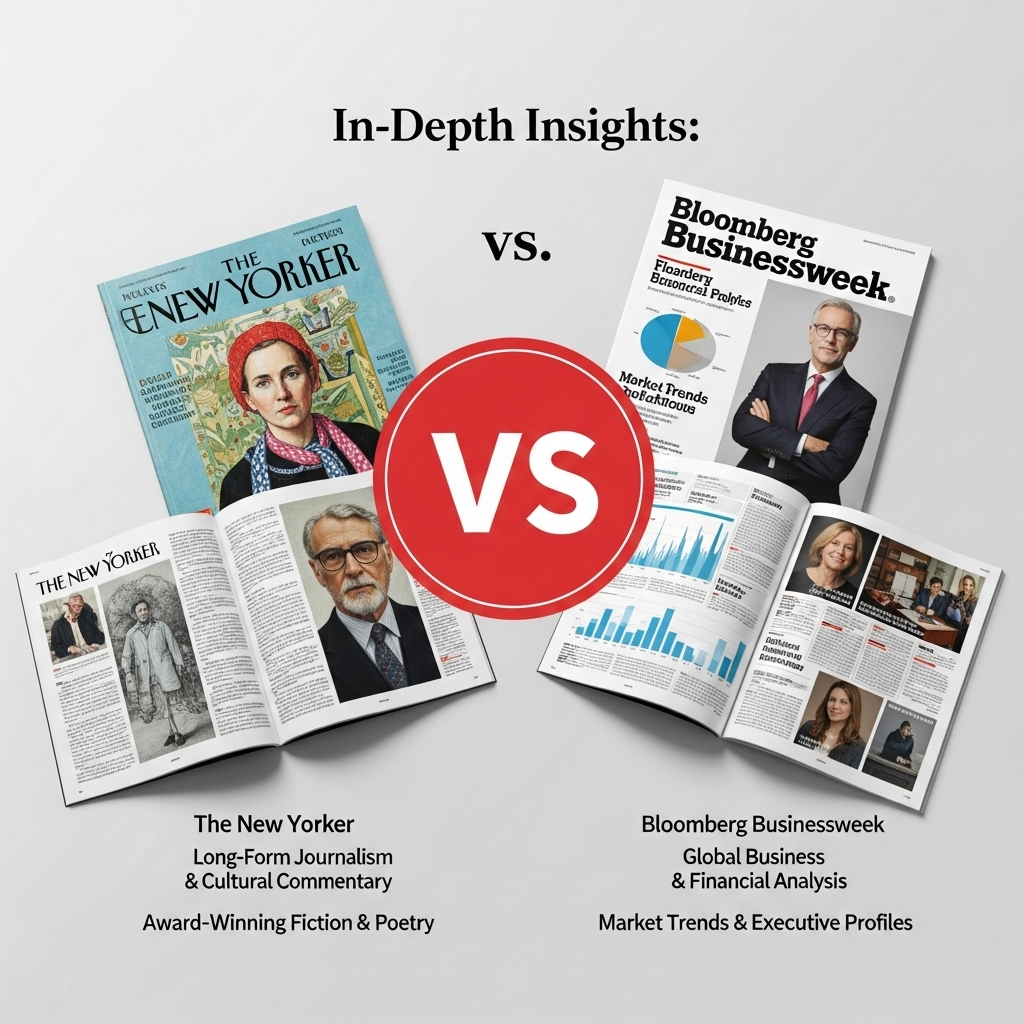Magazines > The New Yorker vs. Bloomberg Businessweek
Choosing between The New Yorker and Bloomberg Businessweek depends on your reading preferences and professional needs. The New Yorker offers a broad range of cultural and political commentary, while Bloomberg Businessweek focuses on business and finance.
This comparison analyzes real-world performance, user feedback, and key differentiators to help you make an informed decision.
Quick Verdict
For readers seeking in-depth cultural analysis and literary content with a left-leaning perspective, The New Yorker is the better choice. For professionals needing business and financial insights, Bloomberg Businessweek is more suitable, despite the higher cost.
- The New Yorker excels in cultural commentary and literary content, while Bloomberg Businessweek is stronger in business and finance.
- The New Yorker's audience is more general, while Bloomberg Businessweek caters to business professionals.
- Bloomberg Businessweek is significantly more expensive than The New Yorker for a digital subscription.
Who Should Choose Which?
Choose The New Yorker if:
Readers interested in literature, arts, culture, and in-depth reporting on a variety of topics, with a left-leaning perspective.
Choose Bloomberg Businessweek if:
Business professionals, investors, and those seeking in-depth analysis of financial markets, industries, and economic trends.

Key features – Side-by-Side
| Attribute | The New Yorker | Bloomberg Businessweek |
|---|---|---|
| Editorial Focus | Broad coverage: journalism, commentary, criticism, essays, fiction, satire, cartoons, and poetry. | Focus on global financial markets, industries, trends, technology, and the economy's key players. |
| Target Audience | Educated, sophisticated, relatively wealthy readers with interests in literature, politics, and culture. | Business leaders, investors, corporate professionals, and small business owners. |
| Writing Style | Known for clarity, conciseness, and erudition balanced with approachability; uses specific punctuation conventions. | No-nonsense, concise, information-packed articles, often with a single-sentence summary. |
| Political Perspective | Leans left, with a predominantly liberal audience. | Aims for political neutrality, though some sources perceive a slight left-center bias. |
| Subscription Cost | Digital: $11.99/month or $119.99/year (sale price $74.95/year). | Digital All Access: $34/month or $415/year. Print: $100/year. |
| Frequency of Publication | 47 issues annually (some are two-week spans). | Monthly (transitioned from weekly in June 2024). |
Overall Comparison
Pros and Cons
The New Yorker
- Comprehensive coverage of current events and cultural trends
- In-depth analysis and insightful commentary
- Engaging and accessible writing style
- Rigorous fact-checking and copy editing
- Unique perspective and voice, blending wit, irony, and cultural commentary
- User-friendly and accessible digital platform
- Strengths in fiction, nonfiction, poetry, arts news coverage, and humor
- Leans to the left and is not entirely unbiased
- Liberalism results in the exclusion of certain positions
Bloomberg Businessweek
- Comprehensive coverage of current events and cultural trends
- In-depth analysis and insightful commentary
- Engaging and accessible writing style
- Strong coverage of business and finance
- Unique perspective on news
- User-friendly digital platform
- Some sources suggest a slight left-center bias
User Experiences and Feedback
The New Yorker
- Offers comprehensive coverage of current events and cultural trends.
- Known for its in-depth analysis and insightful commentary.
- Writing style aims to be engaging and accessible, balancing erudition with approachability.
- Has a distinctive voice, blending wit, irony, and cultural commentary.
- Digital platform is user-friendly and accessible through its website and mobile apps.
- Leans to the left and is not entirely unbiased.
- Whether the subscription cost is worthwhile depends on individual preferences and reading habits.
Bloomberg Businessweek
- Provides comprehensive coverage of current events and cultural trends.
- Offers in-depth analysis and insightful commentary on business, finance, and economics.
- Writing style is generally engaging and accessible.
- Strong coverage of business and finance.
- Aims to provide a different angle on news, making even 'old' news seem new and unique.
- User-friendly and accessible digital platform.
- Considered a leading business news magazine, offering a global perspective and in-depth analysis.
- Differentiates itself through its focus on facts and unique angles.
- Aims to be politically centered and neutral in its reporting. However, some sources rate it as slightly left-center biased.
- Some reviewers believe that the subscription cost is worth the value and content provided, especially considering the high quality of the magazine.
Frequently Asked Questions
Which publication is more politically biased?
The New Yorker leans left, while Bloomberg Businessweek aims for neutrality but is sometimes perceived as slightly left-center.
Which publication is more affordable?
The New Yorker is significantly more affordable for a digital subscription.
Sources & Citations
- Official product specifications
- Expert reviews from tech publications
- User feedback from online forums
Information gathered through AI-assisted web search and analysis. Last updated: August 2025
Methodology & Transparency
Our comparison methodology combines multiple data sources to provide comprehensive, unbiased analysis:
- Data Collection: We gather information from official specifications, user reviews, and independent testing
- AI-Assisted Analysis: Advanced AI helps process large amounts of data while maintaining accuracy
- Human Oversight: All comparisons are reviewed for accuracy and relevance
- Regular Updates: Content is refreshed to reflect new information and user feedback
- Bias Mitigation: We strive for objectivity by considering multiple perspectives and sources
Versusly.ai uses AI-assisted content generation combined with human oversight to deliver comprehensive comparisons. We are transparent about our process and continuously work to improve accuracy and usefulness.